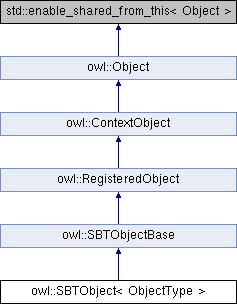owl::SBTObject< ObjectType > Struct Template Reference
#include <SBTObject.h>
Inheritance diagram for owl::SBTObject< ObjectType >:

Public Types | |
| typedef std::shared_ptr< SBTObject > | SP |
 Public Types inherited from owl::ContextObject Public Types inherited from owl::ContextObject | |
| typedef std::shared_ptr< ContextObject > | SP |
 Public Types inherited from owl::Object Public Types inherited from owl::Object | |
| typedef std::shared_ptr< Object > | SP |
Public Member Functions | |
| SBTObject (Context *const context, ObjectRegistry ®istry, std::shared_ptr< ObjectType > type) | |
| virtual std::string | toString () const |
 Public Member Functions inherited from owl::SBTObjectBase Public Member Functions inherited from owl::SBTObjectBase | |
| SBTObjectBase (Context *const context, ObjectRegistry ®istry, std::shared_ptr< SBTObjectType > type) | |
| bool | hasVariable (const std::string &name) |
| Variable::SP | getVariable (const std::string &name) |
| void | writeVariables (uint8_t *sbtEntry, const DeviceContext::SP &device) const |
 Public Member Functions inherited from owl::RegisteredObject Public Member Functions inherited from owl::RegisteredObject | |
| RegisteredObject (Context *const context, ObjectRegistry ®istry) | |
| ~RegisteredObject () | |
 Public Member Functions inherited from owl::ContextObject Public Member Functions inherited from owl::ContextObject | |
| ContextObject (Context *const context) | |
 Public Member Functions inherited from owl::Object Public Member Functions inherited from owl::Object | |
| Object () | |
| virtual DeviceData::SP | createOn (const std::shared_ptr< DeviceContext > &device) |
| void | createDeviceData (const std::vector< std::shared_ptr< DeviceContext >> &devices) |
| template<typename T > | |
| std::shared_ptr< T > | as () |
Public Attributes | |
| std::shared_ptr< ObjectType > const | type |
 Public Attributes inherited from owl::SBTObjectBase Public Attributes inherited from owl::SBTObjectBase | |
| const std::vector< Variable::SP > | variables |
| std::shared_ptr< SBTObjectType > const | type |
 Public Attributes inherited from owl::RegisteredObject Public Attributes inherited from owl::RegisteredObject | |
| int | ID |
| ObjectRegistry & | registry |
 Public Attributes inherited from owl::ContextObject Public Attributes inherited from owl::ContextObject | |
| Context *const | context |
 Public Attributes inherited from owl::Object Public Attributes inherited from owl::Object | |
| const size_t | uniqueID |
| std::vector< DeviceData::SP > | deviceData |
Additional Inherited Members | |
 Static Public Attributes inherited from owl::Object Static Public Attributes inherited from owl::Object | |
| static std::atomic< uint64_t > | nextAvailableID |
Detailed Description
template<typename ObjectType>
struct owl::SBTObject< ObjectType >
same as a SBTObjectBase (ie, still virtual abstract), but adds some type information to help make it easier to differentiate between RayGens, MissPorgs, etc
Member Typedef Documentation
◆ SP
template<typename ObjectType >
| typedef std::shared_ptr<SBTObject> owl::SBTObject< ObjectType >::SP |
Constructor & Destructor Documentation
◆ SBTObject()
template<typename ObjectType >
|
inline |
create a new SBTOBject with this type descriptor, and register it in that registry
Member Function Documentation
◆ toString()
template<typename ObjectType >
|
inlinevirtual |
pretty-printer, for printf-debugging
Reimplemented from owl::ContextObject.
Member Data Documentation
◆ type
template<typename ObjectType >
| std::shared_ptr<ObjectType> const owl::SBTObject< ObjectType >::type |
our own type description, that tells us which variables (of which type, etc) we have
The documentation for this struct was generated from the following file:
- owl/SBTObject.h